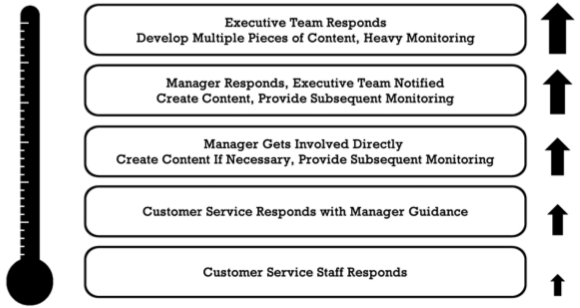In today’s digital landscape, social media is a double-edged sword. While it offers brands a powerful platform to connect with their audience, build loyalty, and amplify their messaging, it also leaves them vulnerable to potential crises that can erupt at a moment’s notice. A single misstep or unforeseen event can spark a wave of negative sentiment, threatening to tarnish even the most reputable brands. But with the right strategic approach, brands can not only survive a social media crisis but come out stronger on the other side.
Identifying a Social Media Crisis
Not every negative comment or tweet requires a full-scale crisis response. The first step in successfully navigating a crisis is distinguishing between regular feedback and an actual crisis.
A crisis often involves:
- High volume: A sudden spike in negative comments or mentions across platforms.
- Speed of escalation: The issue spreads rapidly, gaining traction beyond the original audience.
- Virality potential: If left unaddressed, the situation threatens to go viral, reaching a broader, more public audience.
Examples include high-profile product failures, missteps in brand communication, or controversial statements. Brands like Pepsi and United Airlines, for instance, have both faced massive public backlash on social media due to tone-deaf campaigns or mishandled customer service situations. Recognizing when a crisis is looming allows brands to act quickly and mitigate damage.
Preparing for a Crisis
While it’s impossible to predict when or how a crisis will strike, preparation is the key to navigating one effectively. Building a strong crisis management foundation starts with assembling the right team. This team should include representatives from PR, customer service, legal, and social media—each bringing a unique perspective and skill set to handle various facets of the crisis.
Steps for Preparation:
- Create a Crisis Communication Plan: Outline key response protocols, designate spokespersons, and define roles and responsibilities. Ensure your team knows who will be responsible for monitoring social media, crafting responses, and handling media inquiries.
- Use Social Listening Tools: Proactive monitoring through tools like Brandwatch, Hootsuite, or Sprout Social can help you track brand sentiment and spot potential issues before they explode.
- Set Up Response Protocols: Define clear guidelines on when and how to respond. Decide what situations warrant a public statement versus a direct, private outreach. Be prepared to issue holding statements while gathering more information.
Having a structured plan in place will allow your team to act swiftly and effectively when a crisis arises.

Responding to a Social Media Crisis
When a social media crisis hits, timing is everything. The first few hours are crucial in shaping how the public perceives the brand’s response. While it may be tempting to react immediately, it’s important to balance speed with care.
Here’s how to approach your response:
- Acknowledge the Issue: Silence can be perceived as negligence or indifference. Acknowledge the crisis as soon as possible, even if you don’t have all the answers yet. This shows that you are aware of the situation and are working on a resolution.
- Be Empathetic and Accountable: Demonstrate genuine concern for your audience’s feelings. Apologize when necessary and take accountability for any mistakes made. Avoid deflecting blame, as this can further damage your brand’s reputation.
- Tailor Your Message by Platform: Craft your responses in a way that fits each platform’s tone and audience. Twitter requires short, concise updates, while LinkedIn or Facebook may allow for more detailed explanations.
- Coordinate Internal Communication: Ensure that all teams, from customer service to legal, are aligned on messaging. Mixed or conflicting responses can confuse the public and worsen the crisis.
Avoid common mistakes such as arguing with individuals online or issuing insincere apologies. Always remember that public perception is shaped not only by the problem itself but by how your brand handles it.
Turning Crisis into Opportunity
Though social media crises are challenging, they also present an opportunity to demonstrate your brand’s values, transparency, and resilience. How you respond can help rebuild trust with your audience, and, in some cases, even strengthen your relationship with them.
Some strategies to leverage a crisis as an opportunity include:
- Show Transparency: Keep the public informed as you work to resolve the issue. Share updates on what’s being done to fix the problem and be open about what went wrong.
- Demonstrate Accountability: Show that you’re taking steps to address the root cause of the crisis and are making changes based on feedback. For example, after a backlash over offensive messaging, a brand might publicly commit to revisiting its marketing guidelines.
- Rebuild Trust: Once the dust has settled, highlight the improvements made. Show that your brand has learned from the crisis and is taking proactive steps to avoid similar issues in the future.
Brands like Domino’s Pizza have successfully bounced back from crises by owning up to their mistakes and making tangible changes to their business.

Post-Crisis Evaluation
The work doesn’t end once the crisis has passed. A post-crisis evaluation is essential to learn from the experience and prepare for future challenges. Start by analyzing the overall sentiment recovery. Did the brand manage to restore trust? How was the crisis handled internally?
Key areas to evaluate include:
- What went right, and what went wrong?: Assess the effectiveness of your communication strategy, your team’s responsiveness, and the tools you used for monitoring.
- Adjust Your Crisis Communication Plan: Based on your evaluation, make any necessary updates to your crisis communication plan to be better prepared next time.
- Ensure Long-Term Reputation Management: Continue to monitor your brand’s perception post-crisis and focus on maintaining positive engagement with your audience.
Take Control of Your Social Media Strategy
In today’s fast-paced digital world, a social media crisis can strike at any time. But with preparation, strategic communication, and a strong response plan, brands can navigate these challenges with confidence. Don’t leave your brand’s reputation to chance—partner with experts who can help you manage crises and build lasting trust with your audience.
Contact Bluetext today to ensure your brand is ready to handle any crisis with a tailored social media strategy that protects and strengthens your reputation.



